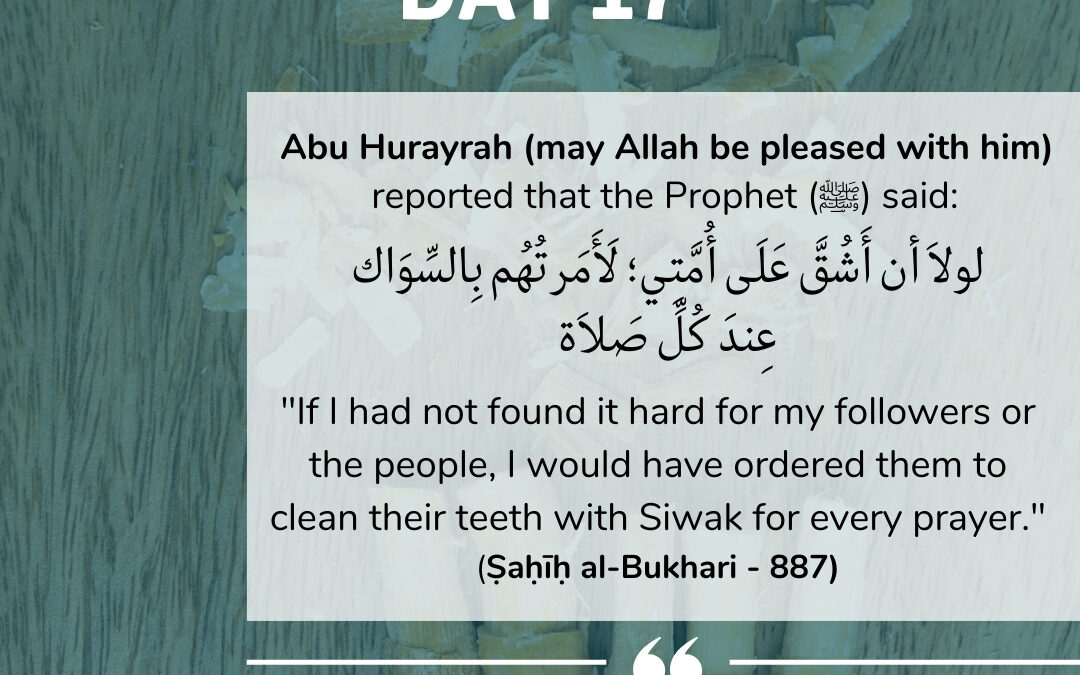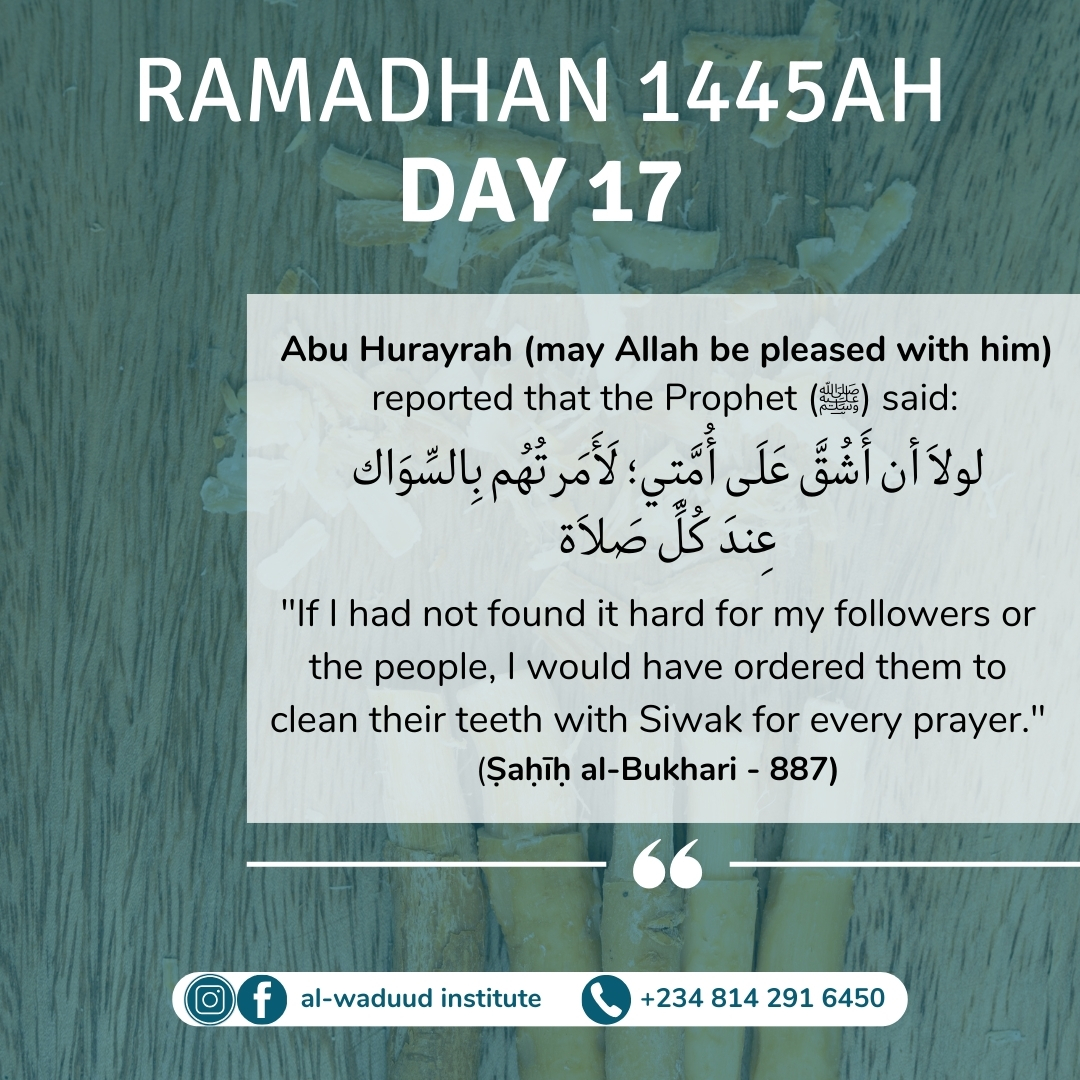Abu Hurayrah (may Allah be pleased with him) reported that the Prophet (ﷺ) said:
لولاَ أن أَشُقَّ عَلَى أُمَّتِي؛ لَأَمَرتُهُم بِالسِّوَاك عِندَ كُلِّ صَلاَة
“If I had not found it hard for my followers or the people, I would have ordered them to clean their teeth with Siwak for every prayer.”
(Ṣaḥīḥ al-Bukhari – 887)
What is siwak?
Siwak means cleaning the mouth and teeth with a siwak which is the name given to the tool used. The siwak is a stick or twig used for this purpose.
Siwak is a method of cleaning the mouth which also earns the pleasure of Allah, as is proven in the hadith of ‘Aishah (may Allah be pleased with her) who said: The Messenger of Allah (peace and blessings of Allah be upon him) said, Siwak cleanses the mouth and pleases the Lord. (Reported by al-Bukhari in his Sahih, 2/274, and by Ahmad, 6/47, and al-Nasai, 1/50. Its isnad is sahih, see al-Irwa 1/105)
Is it sunnah to use the siwak?
Use of the siwak is repeatedly encouraged, as in the hadith of Abu Hurayrah (may Allah be pleased with him), who reported that the Prophet (peace and blessings of Allah be upon him) said: Were it not for the fact that I did not want to make things too hard for my ummah, I would have commanded them to use the siwak at every time of prayer. (Reported by al-Bukhari, 2/299 and Muslim, 1/151). According to another report narrated by al-Bukhari, he said: at every time of making wudu.
Imam al-Nawawi reported that the respectable scholars were agreed that use of the siwak is sunnah and is encouraged. One of the signs of its importance is the fact that some of the salaf (early generations of Islam), such as Ishaq ibn Rahawayh, thought that it was obligatory.
Times when use of siwak is recommended
Siwak is recommended at all times of night and day, because of the general sense of the hadith quoted above from ‘Aishah, Siwak cleanses the mouth and pleases the Lord. The scholars have also mentioned situations where use of the siwak is even more strongly encouraged. These include:
- When making wudu and at times of prayer.
The Prophet (peace and blessings of Allah be upon him) said: Were it not for the fact that I did not want to make things too hard for my ummah, I would have commanded them to use the siwak at every time of prayer. According to another report he said: at every time of making wudu as already stated above.
- When entering one’s home to be with one’s family.
‘Aishah was asked what the Messenger of Allah (peace and blessings of Allah be upon him) did when he first came home. She said, When he entered his house, the first thing he would do was to use the siwak. (Reported by Muslim, 1/220)
- When getting up from sleep. Hudhayfah ibn al-Yaman (may Allah be pleased with him) reported that when the Prophet (peace and blessings of Allah be upon him) got up during the night, he would clean his mouth thoroughly with the siwak. (Reported by al-Bukhari, 1/98 and Muslim, 1/220)
- When the smell of one’s mouth changes whether this is because of eating food with a strong odour, or because of not eating or drinking for a long time, etc. Siwak is cleansing for the mouth, which means that it should definitely be used when the mouth needs cleaning.
- When going to the mosque . Using siwak is part of the adornment which we are commanded to wear for every prayer, as Allah says (interpretation of the meaning): O Children of Adam! Take your adornment while praying [al-A’raf 7:31]. It is also important because the angels are present in the mosque, and one is going to meet with other worshippers there.
When reading Quran and joining gatherings in which Allah is remembered (dhikr), because the angels are present on such occasions.
The scholars (may Allah have mercy on them) are agreed that there is nothing wrong with using siwak during the day when one is fasting , but they differed with regard to using it after noon, which some of them disliked (regarded as makruh). The correct view is that it is sunnah for one who is fasting, just as it is for anyone else, because of the general sense of the reports which prove that it is sunnah. The Prophet (peace and blessings of Allah be upon him) did not make any exceptions or state any specific time, and a statement that is general in nature should continue to be taken as general unless there is evidence to indicate that it is specific in application. The hadith used as evidence to forbid using siwak after noon is attributed to ‘Ali ibn Abi Talib (may Allah be pleased with him), who is quoted as saying that the Prophet (peace and blessings of Allah be upon him) said, When you fast, use siwak in the morning but do not use it in the afternoon. (Reported by al-Daraqutni)
This is a weak hadith. Ibn Hajar said, in al-Talkhis al-Habir, 1/62: a weak isnad). There is no proof that this can be attributed to the Prophet (peace and blessings of Allah be upon him). With regard to the use of the hadith, the odour that comes from the mouth of the fasting person is better in the sight of Allah than the scent of musk (reported by al-Bukhari, 2/29 and Muslim, 2/806) as evidence, this mouth odour will not be dispelled by use of siwak because it is caused by the stomach being empty, and it could occur early in the day if a person has not eaten suhur. All the scholars are agreed that it is permissible for a fasting person to use siwak early in the day. This shows that use of siwak is encouraged even when fasting, and there is no difference between using it early in the day or later on.
What should be used for siwak (cleaning the mouth)
The scholars are agreed that the best thing for cleaning the mouth is the twigs of the arak tree, because of its good smell, and because it has brush-like fibers which are effective for cleaning food particles etc. from between the teeth, and because of the hadith of ‘Abd-Allah ibn Mas’ud (may Allah be pleased with him) who said: I used to gather siwak sticks from the arak tree for the Messenger of Allah (peace and blessings of Allah be upon him). (Reported by Ahmad, 3991; its isnad is hasan, see al-Irwa 1/104)
If arak twigs are not available, the scholars recommended using palm-leaf stalks, or twigs of the olive tree. The hadiths that have been narrated concerning this, however, are not sahih.
The correct view is that any kind of sticks that are cleansing and not harmful may be used instead of siwak, if it is not available, to clean the mouth and remove dirt from the teeth. This includes modern toothbrushes which are known to be beneficial in this regard.
Things that may not be used for siwak
The scholars have stated that it is forbidden to use poisonous sticks, things that are not pure and anything that may cause bleeding, illness or any other harm.
Attributes of siwak
The jurists have described the siwak as a stick of medium length and thickness, no thicker than ones little finger, and free of knots. It should not be so wet that it will twist, because then it will not remove dirt, nor should it be so dry that it will hurt the mouth or crack during use. No doubt this is describing the ideal, otherwise the reports do not specify any particular type of siwak. It is permissible to use any kind of siwak that will do the job.
How to use the siwak
The scholars have differed as to whether siwak should be done with the right hand or the left hand. One group, the majority, think that it is better to use the right hand, because of the general meaning of the hadith narrated by ‘Aishah (may Allah be pleased with her), who said: The Messenger of Allah (peace and blessings of Allah be upon him) liked to start with the right when putting on his shoes, dismounting (from his camel), when cleaning himself, and in all things. (Agreed upon). (They also say that) siwak is an act of worship and drawing closer to Allah, so it should not be done with the left hand.
Other scholars say that it is better to use the left hand for siwak, because it comes under the heading of removing dirt. This is the well-known opinion of Imam Ahmad’s madhhab, and it is the view favoured by Shaykh al-Islam Ibn Taymiyah, may Allah have mercy on him.
Some scholars have said that when a person is using siwak with the intention of following the sunnah, he should use his right hand, and if he is doing it to remove dirt, he should use his left hand. The fact of the matter is that this issue is open, as there is no definitive evidence or report, and every opinion has a valid point.
The jurists suggested that when using siwak, a person should start on the right, and use a side-to-side motion rather than up-and-down, as the latter may harm the gums.
Etiquette of using siwak
Among the etiquette of using siwak, they mentioned the following:
- That a person should not use the siwak in front of others or in public, because this is impolite.
- That the siwak should be washed after use, to get rid of any dirt that may be on it. ‘Aishah (may Allah be pleased with her) said: The Prophet (peace and blessings of Allah be upon him) used to use siwak, then he would give it to me to wash it. I would use it first, then wash it and give it back to him. (Reported by Abu Dawud, 1/45).
- The siwak should be kept in a clean place.
Using one’s fingers to clean one’s mouth
The scholars differ as to whether it is acceptable to use one’s fingers to clean one’s mouth when there is nothing else available. The correct view is that using the fingers cannot be considered as a substitute for the sunnah action, because there is no basis in Islam for doing so, and this method does not clean the mouth as a siwak or similar instrument does. Modern methods of cleaning the teeth, like toothbrushes and so on, that remove dirt and make the mouth smell good, are acceptable.
There is nothing wrong with using siwak that is flavoured with mint, lemon and so on, so long as they do not cause any harm. But a person who is fasting should avoid using any flavoured siwak, and should only use natural siwak when he is fasting.
And Allah knows best.
(Lisan al-Arab (definition of sawaka); al-Majmu’ lil-Nawawi, 1/269; Nihayat al-Muhtaj lil-Ramli, 1/162; Hashiyat Ibn ‘Abidin, 1/78; Nayl al-Awtar lil-Shawkani, 1/24; al-Mughni li Ibn Qudamah, 1/78; al-Futuhat al-Rabbaniyah ‘ala adhkar al-Nawawi li Ibn ‘Allan, 3/256; al-Sharh al-Mumti’ lil-Shaykh Ibn Uthaymin, 1/137)

